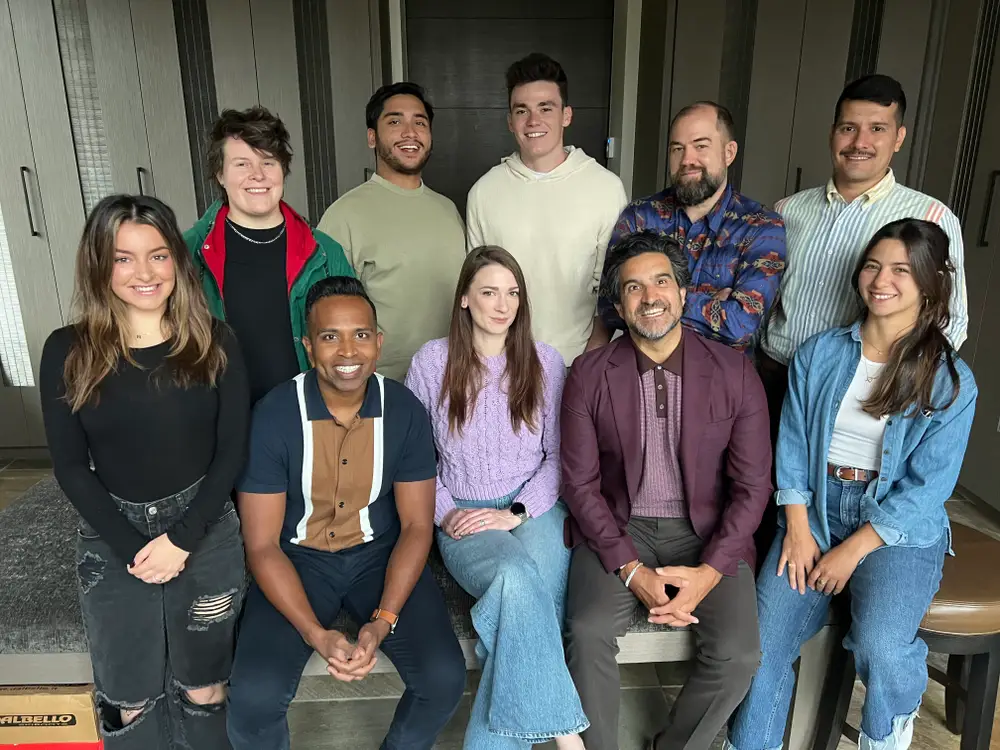An IRL social startup that aims to help strangers connect in group hangouts raised $11.5 million. Read its pitch deck.

The team behind Pie, an IRL-social startup founded by Andy Dunn, is based in Chicago.
Social-networking startups are ditching online friends and followers for in-person, real-life connections.
Pie, a Chicago-based startup founded by menswear brand Bonobos’ Andy Dunn, is joining the race to help people make friends.
One of many emerging “IRL social” apps, Pie lets users plan and join in on IRL hangouts. The app is already equipped with an AI assistant and is piloting an enterprise product offering.
“The battle for offline attention is the next big thing in consumer,” Dunn told B-17.
Amid a loneliness epidemic declared by US Surgeon General Dr. Vivek Murthy, and social-media users growing jaded with online life, startups like Posh (a sort of TikTok feed for events) and 222 (a way to meet strangers via dinners or events) have also raised venture capital this year with apps aiming to help people find friends.
Pie recently announced that it raised a $11.5 million Series A led by Forerunner Ventures’ Kirsten Green. The round also included participation from Chicago-based fund Origin Ventures and Twitter cofounder Ev Williams. Its latest round puts Pie’s total capital raised at $24 million, per the company.
Building and growing an app for making friends
Like many startups, Pie has had to pivot. It launched in 2020 as a friend matchmaking app, akin to a Bumble Friends experience.
“We got a lot of matching, a lot of profile browse, but no one would reach out to the other person,” Dunn said.
After reading Dr. Marisa Fanco’s book “Platonic,” Dunn said he went back to the drawing board. Scrolling through potential friends wasn’t going to cut it — it had to be recurring group hangouts to help people meet and stay connected.
With a team of 10 Chicago-based staffers, Pie doubled down on building an IRL app and using the city as a testing ground.
“Chicago doesn’t have the saturation of consumer apps you have in New York City, Los Angeles, or San Francisco,” Dunn said.
In February and March, the startup began testing local, curated events, dubbed “Pie Originals,” in Chicago, such as a monthly silent book club or a bi-monthly “Dudes Getting Pancakes” hangout. Dunn credits the app’s growth to this strategy. It hit 20,000 monthly active users in six months of testing the Pie Originals.
Local event creators, like Mary Doctor, who hosts a show-and-tell event for adults, have used Pie to gather people and make money.
“There’s this whole creator economy of people who want to bring people together in person,” Dunn added.
With its Series A capital, Pie is rolling out a creator fund for event hosts, which pays $5 to the creator for every RSVP to an event (all of which are free for attendees).
The startup plans to experiment with different monetization models, eyeing a potential freemium model that apps like Bumble and Hinge have opted for.
“This is venture-backed startups,” Dunn said, adding that by the time of Pie’s Series B, it will have a monetization engine locked down. “You have costs, and then you figure out revenues later.”
In the meantime, Dunn is betting on Pie’s Gen-Z staff and the app’s user growth, which stands at 40% month-over-month.
Read the 31-page pitch deck that Andy Dunn used to raise Pie’s Series A:
Pie’s pitch focuses on how it will help people overcome social isolation.

The deck starts with a reference to the US Surgeon General’s declaration of a “social isolation pandemic.”

“In the last two decades, we’ve lost 24 hours of in-person time per month,” the slide reads.
Then Pie cites research about loneliness from more than two decades ago.

Pie cites Dr. Marisa Franco’s book “Platonic,” too.

Pie compares its feed to the social media feeds we already have.

The deck includes testimonials from users.

Pie outlines the competitive landscape of IRL social apps.

In the redacted slide, Pie cites companies like Meetup, Eventbrite, Partiful, and iMessage as competitors.
The app began testing “Pie Originals,” events curated for Chicago, earlier this year.

The app also has “creators” who host events.

Then the deck breaks down its design and user experience.

Pie wants to use the friends-of-friends network effect to scale and help people meet.

Pie is also equipped with AI.

Its AI assistant will help people make dinner plans.



Users are able to have profiles.


Then Pie breaks down its growth so far.

User retention increases after three plans.

Pie illustrates how it’s working so far in Chicago.

Then Pie draws similarities to the creator economy.

The redacted slide cites Eventbrite as part of the “old gen” and Uber and Airbnb as part of the “new gen.”
It also compares its market opportunity to Airbnb and Uber.

Pie launched a creator fund to help pay creators.

It’s also building out an enterprise product offering.

Companies can use Pie to connect coworkers.

Pie lays out its monetization roadmap.

Its enterprise product will be key to Pie’s monetization strategy early-on.

Wrapping up, Pie introduces CEO and founder Andy Dunn.

It also introduces its team of 10 staffers.

And notable investors and shareholders.

Pie updated some parts of its pitch deck in the copy it shared with B-17, including investments from its Series A.






